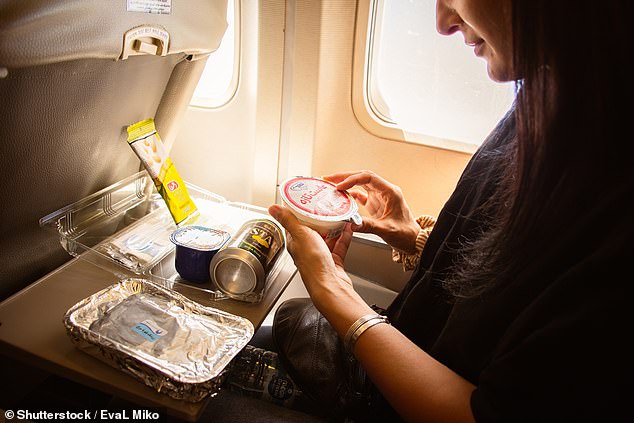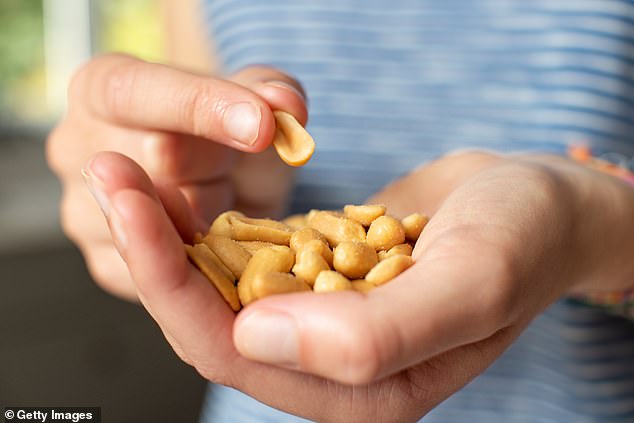It’s a belief that has caused many airlines to ban the popular snack.
But it turns out there is no evidence that nut allergens can spread through airplane ventilation systems, according to a scientific review.
They found that advertisements asking passengers not to eat nuts during flights are unlikely to reduce the risk of in-flight reactions and could provide false reassurance.
Instead, debris left on surfaces, such as trays and seatback video screens, poses the greatest risk to those passengers.
This risk is increased by the fast delivery times of low-cost airlines, but could be mitigated by rapid removal, they suggest, allowing anyone with a nut allergy to board early.
Advertisements asking passengers not to eat nuts during flights are unlikely to reduce the risk of in-flight reactions and could provide false reassurance, the review suggested.
Even then, food allergic reactions are up to 100 times less likely to occur during flights than on the ground, although this could be because passengers take precautions.
Food allergy is the most common cause of anaphylaxis, a life-threatening allergic reaction.
It is estimated that around 2 to 3 per cent of children and 1 to 2 per cent of adults in the UK have a food allergy.
Researchers at Imperial College London carried out a systematic review of published evidence dating back to 1980 on behalf of the UK’s Civil Aviation Authority (CAA).
While peanut allergens can be detected at very low levels in the air when nuts are shelled, the dust settles quickly and very little dust circulates in the air.
Cabin ventilation systems are designed to circulate air through the aircraft, rather than throughout the cabin, so that the potential for passenger-generated contaminants to spread through the cabin is minimized. , the authors said.

Peanut residue left on surfaces, such as trays and seat-back video screens, pose the greatest risk to those passengers.
The air is completely renewed every three to four minutes during a flight, compared to every 10 minutes in hospitals and classrooms.
On modern commercial airliners, approximately half of the incoming air is recirculated air that has passed through particulate air filters that effectively remove dust, vapors, and microbes while capturing aerosolized food particles. .
The other half comes from outside, the authors explain, with allergic reactions to aerosolized foods being rare.
Food proteins are often “sticky” and any inadvertent exposure is likely due to surface contamination, according to findings published in the Archives of Disease in Childhood.
This can be transferred from your hands to the food you eat or directly to your mouth or face.
Cleaning these surfaces at the start of a flight with disinfectant wipes will minimize this risk and is “particularly important, given the minimal cabin cleaning that often occurs between flights, especially with low-cost airlines.”
Paul Turner, clinical professor of anaphylaxis, pediatric allergy and clinical immunity at Imperial College London, who led the research, said the findings should reassure passengers.
He said: “People should not worry about food becoming airborne when they fly.”
“We have not found any evidence that walnut particles can pass through the aircraft cabin ventilation system and cause reactions.”
He added: ‘The only thing people need to do to protect themselves is clean their seating area.
“If people with food allergies can get on first and have time to clean their seating area with something like a baby wipe or antibacterial wipe, they are much less likely to have accidental reactions.”
Researchers suggest that people at risk should carry adrenaline auto-injectors, such as an EpiPen, in their carry-on luggage, as they are not always included in on-board medical kits.
The report will be presented to major airlines, patient groups and anaphylaxis charities in a bid to achieve a consistent policy across all airlines operating from the UK and internationally “to reflect what the evidence is and really make a difference to passengers with food allergies.
Simon Williams, chief executive of Anaphylaxis UK, said: “A key take-home message is the importance of passengers cleaning their seating area, including the tray table and seatback entertainment system.”

